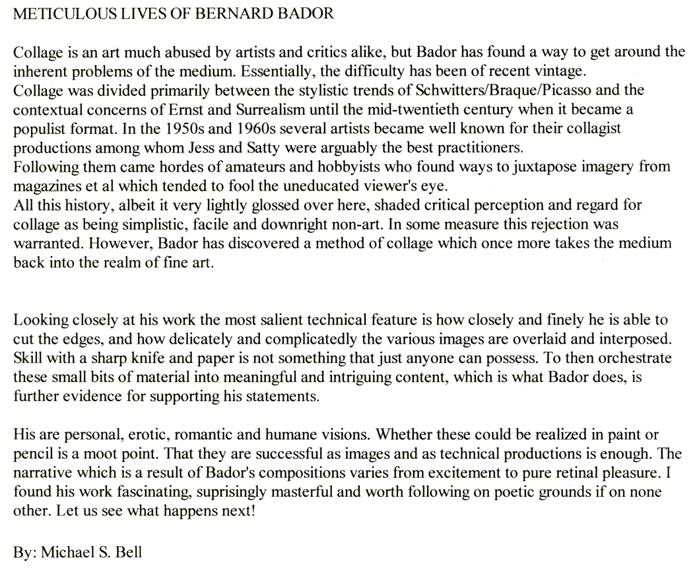THE ART OF BERNARD BADOR
Along with Max Ernst and Jess Collins, Bernard Bador is one of the finest collage artists of the 20th/21st centuries. Like Ernst and Jess (as Collins preferred to be called), Bador’s primary tool is metaphor. Such art operates outside the realm of ordinary descriptive meaning to build structures that are dream-like and fantastic. Like plotless Surrealist reveries, these photo-montages scan the unconscious. The best of collage art continues to keep pace with real time, for today, perhaps more than ever, we live in a world of flux, in which images of the actual world are increasingly “cut” and “pasted” into virtual juxtapositions.
As “cut-and-paste” artists, Ernst, Jess and Bador all present reassembled images that interrupt each other in the process of presenting original metaphoric alignments. However, there are significant differences in their approach to collage. In his famous book, Une semaine de bonté, Ernst mainly depended on complete existing illustrations which he altered with a few pasted on additions. Jess, in an opposite fashion, often presents a wide range of fragmentary images that make up a kaleidoscopic blizzard. In contrast with both earlier artists, Bador generally presents a theatrical assembly of several key images, each of which, alone, or in juxtaposition, holds its own identity.
There is also a fascinating interplay between the East and the West in Bador’s collages. Buddhas, geishas, and medieval Japanese castles crop up in association with material from European and American commercial magazines, anatomical diagrams, and sports photos. In this regard, Bador’s collages are especially remarkable for the extent to which they frisk about, punning on a 21st century global perspective. At once humorous, ghostly, elegant, and metaphysical, Bador’s art is a gorgeous testament to the metaphor as the primary building block of the autonomous imagination.
Bernard Bador is also an extraordinary poet whose dark verbal metaphors back up his visual image flux. Besides several collections in French, in 1986 Panjandrum Press in Los Angeles published, in French and in English, a 44 poem collection called Sea Urchin Harakiri, which I co-translated and edited with him. A new edition of this book including 30 new poems, to be called Curdled Skulls, will be published by Black Widow Press in Boston in 2010.
Clayton Eshleman, poet and essayist
September, 2009
Along with Max Ernst and Jess Collins, Bernard Bador is one of the finest collage artists of the 20th/21st centuries. Like Ernst and Jess (as Collins preferred to be called), Bador’s primary tool is metaphor. Such art operates outside the realm of ordinary descriptive meaning to build structures that are dream-like and fantastic. Like plotless Surrealist reveries, these photo-montages scan the unconscious. The best of collage art continues to keep pace with real time, for today, perhaps more than ever, we live in a world of flux, in which images of the actual world are increasingly “cut” and “pasted” into virtual juxtapositions.
As “cut-and-paste” artists, Ernst, Jess and Bador all present reassembled images that interrupt each other in the process of presenting original metaphoric alignments. However, there are significant differences in their approach to collage. In his famous book, Une semaine de bonté, Ernst mainly depended on complete existing illustrations which he altered with a few pasted on additions. Jess, in an opposite fashion, often presents a wide range of fragmentary images that make up a kaleidoscopic blizzard. In contrast with both earlier artists, Bador generally presents a theatrical assembly of several key images, each of which, alone, or in juxtaposition, holds its own identity.
There is also a fascinating interplay between the East and the West in Bador’s collages. Buddhas, geishas, and medieval Japanese castles crop up in association with material from European and American commercial magazines, anatomical diagrams, and sports photos. In this regard, Bador’s collages are especially remarkable for the extent to which they frisk about, punning on a 21st century global perspective. At once humorous, ghostly, elegant, and metaphysical, Bador’s art is a gorgeous testament to the metaphor as the primary building block of the autonomous imagination.
Bernard Bador is also an extraordinary poet whose dark verbal metaphors back up his visual image flux. Besides several collections in French, in 1986 Panjandrum Press in Los Angeles published, in French and in English, a 44 poem collection called Sea Urchin Harakiri, which I co-translated and edited with him. A new edition of this book including 30 new poems, to be called Curdled Skulls, will be published by Black Widow Press in Boston in 2010.
Clayton Eshleman, poet and essayist
September, 2009
